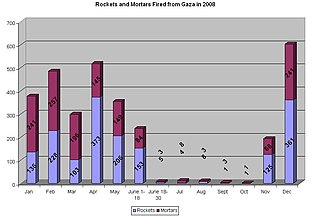
The 84th "Givati" Brigade is an Israel Defense Forces infantry brigade formed in 1947.

The Popular Resistance Committees (PRC) is a coalition of a number of armed Palestinian groups opposed to what they regard as the conciliatory approach of the Palestinian Authority and Fatah towards Israel. The PRC is especially active in the Gaza Strip, through its military wing, the Al-Nasser Salah al-Deen Brigades. The PRC has planned and executed a number of varied operations, but specializes in planting roadside bombs and vehicle explosive charges - directed against military and civilian convoys.

Gilad Shalit is a former MIA soldier of the Israel Defense Forces (IDF) who on 25 June 2006, was captured by Palestinian militants in a cross-border raid via tunnels near the Israeli border. Hamas held him captive for over five years, until his release on 18 October 2011 as part of a prisoner exchange deal.

The 2006 Israel–Gaza conflict known in Israel as Operation Summer Rains was a series of battles between Palestinian militants and the Israel Defense Forces (IDF) during summer 2006, prompted by the capture of Israeli soldier Gilad Shalit by Palestinian militants on 25 June 2006. Large-scale conventional warfare occurred in the Gaza Strip, starting on 28 June 2006, which was the first major ground operation in the Gaza Strip since Israel's unilateral disengagement plan was implemented between August and September 2005.
Ahmed al-Jabari was a senior leader and second-in-command of the military wing of Hamas, the Izz ad-Din al-Qassam Brigades. He was widely credited as the leading figure in the Hamas takeover of the Gaza Strip, and commanded the 2006 Hamas cross-border raid which resulted in the capture of Israeli soldier Gilad Shalit. Under his command, along with chief logistics officer Mahmoud al-Mabhouh, Hamas developed its own military weapons capability significantly by acquiring longer-range guided missiles and rockets.

In 2008, Israel sought to halt the rocket and mortar fire from Gaza that killed four Israeli civilians that year and caused widespread trauma and disruption of life in Israeli towns and villages close to the Gaza border. In addition, Israel insisted that any deal include an end to Hamas's military buildup in Gaza, and movement toward the release of Corporal Gilad Shalit. Hamas wanted an end to the frequent Israeli military strikes and incursions into Gaza, and an easing of the economic blockade that Israel has imposed since Hamas took over the area in 2007.

The Gaza–Israel conflict is a part of the localized Israeli–Palestinian conflict, but is also a scene of power struggle between regional powers including Egypt, Iran and Turkey together with Qatar, supporting different sides of the conflict in light of the regional standoff between Iran and Saudi Arabia on one hand and between Qatar and Saudi Arabia on the other, as well as crisis in Egyptian-Turkish relations.

The Free Gaza Movement (FGM) is a coalition of human rights activists and pro-Palestinian groups formed to break Israel's blockade of the Gaza Strip and publicise the situation of the Palestinians there. FGM has challenged the Israeli–Egyptian blockade by sailing humanitarian aid ships to Gaza. The group has more than 70 endorsers, including Desmond Tutu and Noam Chomsky.

The Gaza War, also known as Operation Cast Lead, also known in the Muslim world as the Gaza Massacre, and referred to as the Battle of al-Furqan by Hamas, was a three-week armed conflict between Gaza Strip Palestinian paramilitary groups and the Israel Defense Forces (IDF) that began on 27 December 2008 and ended on 18 January 2009 with a unilateral ceasefire. The conflict resulted in between 1,166 and 1,417 Palestinian and 13 Israeli deaths.

The 2008 Israel–Hamas ceasefire was an Egyptian-brokered six-month Tahdia "for the Gaza area", which went into effect between Hamas and Israel on 19 June 2008. According to the Egyptian-brokered agreement, Israel promised to stop air strikes and other attacks, while in return, there would not be rocket attacks on Israel from Gaza. Once the ceasefire held, Israel was to gradually begin to ease its blockade of Gaza.

The 2006 Gaza cross-border raid was an armed incursion carried out by seven or eight Gazan Palestinian militants on 25 June 2006 who attacked Israel Defense Forces (IDF) positions near the Kerem Shalom Crossing through an attack tunnel. In the attack, two IDF soldiers and two Palestinian militants were killed, four IDF soldiers were wounded, one of whom was Gilad Shalit, who was captured and taken to the Gaza Strip.

The Gilad Shalit prisoner exchange, also known as "Wafa al-Ahrar", followed a 2011 agreement between Israel and Hamas to release Israeli soldier Gilad Shalit in exchange for 1,027 prisoners — almost all Palestinians and Arab-Israelis, although there were also a Ukrainian, a Jordanian and a Syrian. Two hundred and eighty of these had been sentenced to life in prison for planning and perpetrating various attacks against Israeli targets.

The Hannibal Directive is a controversial procedure that Israel Defense Forces (IDF) have used follow to prevent the capture of Israeli soldiers by enemy forces.

Kerem Shalom border crossing is a border crossing at the junction of the Gaza Strip–Israel border and the Gaza–Egypt border. It is managed by the Israel Airports Authority, and is used by trucks carrying goods from Israel or Egypt to the Gaza Strip.
Hana Shalabi is a Palestinian prisoner in Israel, held in administrative detention.













